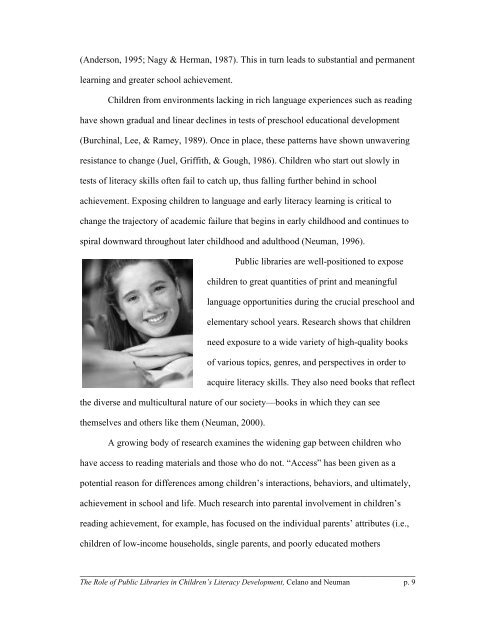Role of Libraries
Role of Libraries
Role of Libraries
Create successful ePaper yourself
Turn your PDF publications into a flip-book with our unique Google optimized e-Paper software.
(Anderson, 1995; Nagy & Herman, 1987). This in turn leads to substantial and permanent<br />
learning and greater school achievement.<br />
Children from environments lacking in rich language experiences such as reading<br />
have shown gradual and linear declines in tests <strong>of</strong> preschool educational development<br />
(Burchinal, Lee, & Ramey, 1989). Once in place, these patterns have shown unwavering<br />
resistance to change (Juel, Griffith, & Gough, 1986). Children who start out slowly in<br />
tests <strong>of</strong> literacy skills <strong>of</strong>ten fail to catch up, thus falling further behind in school<br />
achievement. Exposing children to language and early literacy learning is critical to<br />
change the trajectory <strong>of</strong> academic failure that begins in early childhood and continues to<br />
spiral downward throughout later childhood and adulthood (Neuman, 1996).<br />
Public libraries are well-positioned to expose<br />
children to great quantities <strong>of</strong> print and meaningful<br />
language opportunities during the crucial preschool and<br />
elementary school years. Research shows that children<br />
need exposure to a wide variety <strong>of</strong> high-quality books<br />
<strong>of</strong> various topics, genres, and perspectives in order to<br />
acquire literacy skills. They also need books that reflect<br />
the diverse and multicultural nature <strong>of</strong> our society—books in which they can see<br />
themselves and others like them (Neuman, 2000).<br />
A growing body <strong>of</strong> research examines the widening gap between children who<br />
have access to reading materials and those who do not. “Access” has been given as a<br />
potential reason for differences among children’s interactions, behaviors, and ultimately,<br />
achievement in school and life. Much research into parental involvement in children’s<br />
reading achievement, for example, has focused on the individual parents’ attributes (i.e.,<br />
children <strong>of</strong> low-income households, single parents, and poorly educated mothers<br />
________________________________________________________________________<br />
The <strong>Role</strong> <strong>of</strong> Public <strong>Libraries</strong> in Children’s Literacy Development, Celano and Neuman p. 9


